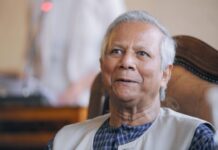
European Union (EU) ambassador to Bangladesh Rensje Teerink delivers keynote speech at Cosmos Dialogue at Six Seasons Hotel in Dhaka on Saturday. Photo: UNB
Appreciating Bangladesh’s very impressive economic performance over the last one decade, the European Union (EU) on Saturday said sustaining and accelerating this growth is the real challenge for the new government, reports UNB.
“I think sustaining and accelerating this growth is, of course, the real challenge for the new government,” said EU ambassador to Bangladesh Rensje Teerink while delivering her keynote speech at Cosmos Dialogue at a city hotel.
The ambassador said they are also very keen to pursue and enhance engagement with this new government with a view to contributing and supporting the deepening of democracy without which, she thinks, a sustainable development will not happen.
Cosmos Foundation organised the symposium titled ‘Bangladesh-European Union Relations: Prognosis for the Future’ as part of its Ambassador Lecture Series.
Foreign secretary Md Shahidul Haque attended the event as the chief guest, which was held with Iftekhar Ahmed Chowdhury, Principal Research Fellow, Institute of South Asian Studies (ISAS), National University of Singapore, in the chair. Cosmos Foundation Chairman Enayetullah Khan delivered the welcome address.
Foreign secretary Haque said the relationship between Bangladesh and the EU is a very mature and dynamic one as both sides understand each other’s concerns well.
“You must have noticed by now that Bangladesh is not only looking at the EU but it’s also the centerpiece of our foreign policy,” he said adding that not only the EU is evolving but Bangladesh is also evolving — the relationship is evolving.
The EU ambassador laid emphasis on equal distribution of the benefit of Bangladesh’s economic expansion among all the people saying that poverty can only be reduced partially if the growth dividend is not distributed among all equally.
I don’t want to give a negative picture because, of course, the bottom line is that Bangladesh’s story is a success story,” she said mentioning that they welcome the very strong vision and planned graduation from its LDC status by 2024 and to become an upper middle-income country by 2021.
Ambassador Teerink stressed the importance of export diversification and boosting foreign and local investment to help the country grow in a faster way. “So, my point of export diversification should be taken as a political priority.”
GSP+ and Bangladesh
Talking about the passage from the EU’s current Everything but Arms (EBA) to GSP+ trade privilege, the EU ambassador said GSP+ is not something that is automatic to become eligible as Bangladesh will have to ratify, implement and accept 27 core conventions on human rights,labour rights, environmental and good governance standards.
“This is an important task. I think it would be good to prioritise this and set up relevant taskforce to establish a multi-annual reform action plan,” said ambassador Teerink.
In this context, foreign secretary Haque said they will have to move on the GSP+ and time has come to discuss the matter.
He said they have already discussed it that the whole business environment has to be revisited within the GSP+. “So, that’s a big chunk of area.”
The EU envoy said a tangible progress has taken place in factory safety, thanks to the joint efforts carried out by Accord and Alliance, the government of Bangladesh and other partners.
She, however, said much more needs to be done, especially in the area of freedom of association.
Ambassador Teerink said sustainable industrial development would be difficult to achieve in Bangladesh without any effective and functioning social dialogue.
On business environment, the EU ambassador said the key ministries should be given robust political authority to design, coordinate and implement policy reforms to improve the business environment.
She said there are many laws in the country but it is important to see those are implemented properly.
The EU ambassador said they are committed to working with the civil society of Bangladesh as they look back the enormous role played by big NGOs in Bangladesh.
She said this is an area they want to continue working together as the civil society with all its diversity represents a crucial component of any democracy. “So, it’s an asset to promote good governance and improve accountability.”
Ambassador Teerink said they wish to explore cultural diplomacy and showcase Bangladesh’s cultural richness to Europe apart from strengthening people-to-people contact.
She said human rights are the integral part of the EU-Bangladesh relationship, and they see those as crucial for stability, economic growth and for the development of Bangladesh.
Ambassador Teerink said the cooperation between Bangladesh and the EU has been gradually expanding beyond the cooperation agreement.
“That is always very positive,” she said adding that the relationship should not be confined to signed documents.
Rohingya Issue
Ambassador Teerink said Bangladesh has played such a crucial role over the Rohingya issue which was appreciated widely across the world.
“We’ve to thank the people of Bangladesh for their generous support to the Rohingya community,” she said adding that the EU supports voluntary, safe, sustainable and dignified return of Rohingyas to their place of origin in compliance with international laws.
The ambassador said they have also committed to continuing their efforts to mobilise political support, humanitarian assistance at bilateral and multilateral levels to help bring about a lasting solution to this crisis.
Sharing EU’s concerns in a few areas, she said they remain concerned about the Digital Security Act that was adopted in 2018.
The EU ambassador said they still call upon the government of Bangladesh to continue consultation on this law to make sure this act is brought in accordance with the international declaration of human rights and the constitution of Bangladesh.
Iftekhar said both Europe and Bangladesh, in different ways, are looking forward to a period of intense cooperation. “Is this too much to expect? Are we aiming too high? Are we being too ambitious? I don’t think so,” he added.
He said many countries like Bangladesh traditionally saw the UK as the gateway to Europe. “We need to focus more on Europe directly.”
For Bangladesh certainly, Iftekhar said, EU’s policy of unimpeded market access for Bangladeshi products under EBA umbrella has been a great boom to RMG export. “Bangladesh’s RMG industry has been the locomotive of our growth, prospect and prosperity.”
Enayetullah Khan said Cosmos Foundation’s Ambassador Lecture Series is designed to expand understanding of bilateral relations between the country’s guest speakers and Bangladesh community.
He said they will continue to hold similar events in the future as the idea would reflect upon and expand the understanding of key issues.
Secretary (Asia & Pacific) at the Ministry of Foreign Affairs Mahbub Uz Zaman, German ambassador in Dhaka Peter Fahrenholtz, France ambassador Marie-Annick Bourdin, UN Resident Coordinator in Dhaka Mia Seppo, British deputy high commissioner to Bangladesh Kanbar Hossein-Bor, prominent businessman Salahuddin Kasem Khan, managing director of Mohammadi Group Rubana Huq and former diplomats also spoke on the occasion.









